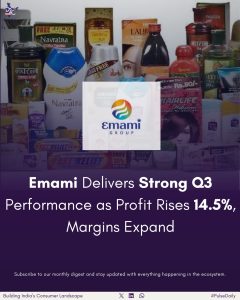
Health-tech startup Ultrahuman is projecting a revenue milestone of ₹1,100 crore in FY26, nearly doubling its topline from the previous fiscal, as it prepares for deeper international expansion. Founder Mohit Kumar shared this ambitious outlook in a recent interview with Entrackr, highlighting a strategy centered on scale, innovation, and sustainable profitability.
In FY25, Ultrahuman reported revenues of ₹565 crore and a profit after tax of ₹73 crore. Kumar noted that the company aims to maintain a profit multiple of about 1.5× in FY26 even as it increases investments in research and development and facility expansion. Having already built a strong presence in the United States, Ultrahuman is now intensifying its efforts across Europe, the U.K., and Canada, bolstered by the recent acquisition of a U.K.-based business to enhance its international footprint. Kumar observed that while the U.S. market offers a more centralized retail structure, Europe remains fragmented, demanding localized distribution, regulation compliance, and tailored marketing strategies.
Ultrahuman’s wearable ecosystem—anchored by its smart ring and continuous glucose monitoring (CGM) service—continues to drive the company’s growth trajectory. The ring remains its top-selling product, followed by the CGM service, with around 60–65% of ring users being women attracted to features such as temperature tracking and fertility insights. The company now serves over 500,000 users, adding between 70,000 and 120,000 new users each month. The CGM program has maintained a 95% retention rate, emerging as a reliable revenue driver, while subscription renewals stand at about 75–80%, contributing nearly 16% to total earnings.
Though Ultrahuman’s global footprint is expanding rapidly, India currently contributes about 6% to its overall revenue, a share that has doubled year-on-year. The company plans to launch an omnichannel retail model in Bengaluru, Mumbai, and Delhi this November to strengthen its domestic presence. Looking ahead, Ultrahuman estimates the global health-metrics device market at $10 billion annually and aims to scale device sales fivefold within two years, targeting between 1.5 and 2 million units per month to capture as much as 10% of the global market.
Kumar also revealed plans to expand into Thailand, Singapore, the Middle East, and Australia, regions witnessing rising demand for personalized wellness technology. He emphasized that for Indian startups to succeed globally, it is crucial to understand local ecosystems—especially in areas like regulation, automation, hiring, and distribution. “Global expansion isn’t just about replicating what worked in India—it’s about re-engineering your model to fit entirely new ecosystems,” he said.
With a solid financial foundation, a loyal user base, and strong product-market fit, Ultrahuman is positioning itself as a leading player in the global wearables and metabolic health technology space.








